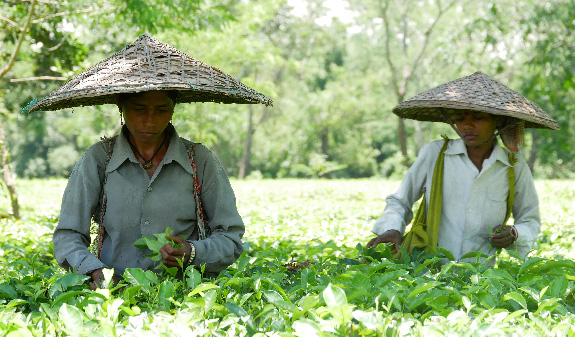Orthodox production Though the vast majority of tea produced on Jalinga is CTC, we are more concerned with their orthodox production since that is the tea that we buy. We had noticed that the pluckers were picking more than two leaves and a bud and we were informed that this is for the CTC production (and therefore likely to find its way into paper teabags). Much greater care is given to the collection of orthodox leaf with specially trained pluckers, of which there are about 100, only selecting the top two leaves and buds from a designated area where the leaf (from seeded plants, not clonal) is fragrant and of high quality. This leaf is delivered to the factory where it is withered for between 14 to 18 hours to achieve a moisture content of 60%. This differs to CTC which is withered to 72% moisture over 12 to 16 hours. After the withering process orthodox tea is sent to the rolling table (rather than the CTC shredder) where the leaves are rolled and twisted with the intention of keeping them as whole as possible. Next the leaves are oxidised for around 2 hours and 20 minutes - a longer period than the 1 hour and 20 minutes for CTC but this is due to the larger size of the leaf. Next, the oxidised leaves are fired in 3 stage dryers which involves passing the leaves through 3 different ranges of temperatures that fall between 120F to 180F). This takes around 25 minutes. Finally, the tea is sent to the grading room where sieves are used to separate the various sizes of dried black leaf. Grades include TGFOP (tippy, golden, flowery orange pekoe) and GBOP (Golden broken orange pekoe). It was reassuring to learn how much care is taken over the production of the orthodox leaf that we buy for Storm’s Organic Breakfast Blend. The contrast between this tea and the leaves selected and processed for paper teabags was like chalk and cheese! Harvesting on Jalinga takes place between March and December. The first flush occurs during March and April and the second flush from June to August. Plucking continues until December during what are known as the Monsoon and Autumn flushes.
Life at the Jalinga Tea Garden It is always very difficult to assess what life must be like living as a tea plucker or a factory operative on any tea garden, since we are bound to make comparisons to our own privileged and fortunate lifestyles. However, through our own audit of social conditions we learnt of some of the benefits provided to all workers at Jalinga: - A yearly bonus that is paid in September as a one-off payment.
- A hospital for the use of all employees.
- 500g of rice per worker per day
- 200g of tea per worker per month
- Individual houses and electricity for each family
- Gardens with each house so that the family can grow vegetables and rear animals. Most families had several cows and chickens.
- 4 schools within the garden with free education
- 3 cricket/football grounds - one at each division of Jalinga
- 2 free eco stoves for each family which use 60% less fuel (wood and bamboo)
- A weekly market and shops around the garden
- Temples throughout all divisions of the garden
- Workers union membership
| 

Follow storm
Sign up for news & offers